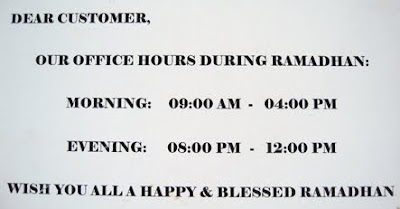It's not easy to fast from sunrise to sunset, but it is possible and millions of people will choose to fast during daylight hours for the entire month of Ramadan.
According to friends who fast [sigh-yim] there are two aspects to fasting: the first is the physical, or dealing with your thirst and hunger and the second is the mental aspect, or your intention [knee-yaH] and dealing with the reasons behind why you are fasting.
Some Muslims of the Shi’ite/Shia faith {see wgaw blogspot:
Creeds of Islam} choose to fast for an additional two months preceding the Holy Month of Ramadan. I’ve only ever come across men choosing to do this. When asked why they would spend so much time choosing not to eat, they've all answered they believe they'll gain extra points when it comes to entering heaven.
In addition to the Ramadan fast, some Muslims will fast every Monday and Thursday, throughout their adult lives, but I’ve only ever come across women doing this. When asked why they fast during the week, their answer is the same as in the previous example, to get extra points when entering heaven.
Who Should not fast During Ramadan?Everyone is expected to fast in Ramadan, but there are some people who are not allowed to fast: the old, the young and the sick. The Qur'an states for those people who are sick, or can not endure it, “There is a ransom: the feeding of a poor man.”
People who should not fast include:
1. Non-Muslims
2. Children below the age of puberty
3. The old and infirm. However they must pay compensation in the form of Fidyah [fee-dee-yah]. That is, they must give a sum of money equal to the cost of feeding one poor person, for each day they are unable to fast.
4. The sick, if fasting will cause harm. Those who are sick and able to fast must do so.
5. The mentally ill
There are three additional reasons for missing a day's fasting during Ramadan:
1. women who are menstruating or have postpartum bleeding are forbidden to fast. However they must make up the missed days later
2. Pregnant, or nursing women may stop fasting and make up the missed days later
3. Travellers who are intending to travel should not fast on that day. Again they should make up the missed day/s at a later time. The Qur'an states, “He who is ill or on a journey shall fast a similar number of days later on”















































































































































